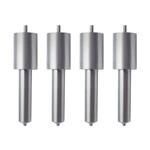Information injection-pump assembly
BOSCH
9 400 617 206
9400617206
ZEXEL
106673-2060
1066732060
MITSUBISHI
ME157064
me157064
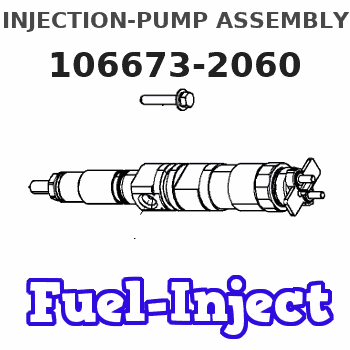
Rating:
Service parts 106673-2060 INJECTION-PUMP ASSEMBLY:
1.
_
7.
COUPLING PLATE
8.
_
9.
_
11.
Nozzle and Holder
ME059621
12.
Open Pre:MPa(Kqf/cm2)
21.6{220}
15.
NOZZLE SET
Include in #1:
106673-2060
as INJECTION-PUMP ASSEMBLY
Cross reference number
BOSCH
9 400 617 206
9400617206
ZEXEL
106673-2060
1066732060
MITSUBISHI
ME157064
me157064
Zexel num
Bosch num
Firm num
Name
9 400 617 206
ME157064 MITSUBISHI
INJECTION-PUMP ASSEMBLY
6D22T * K 14CA INJECTION PUMP ASSY PE6P,6PD PE
6D22T * K 14CA INJECTION PUMP ASSY PE6P,6PD PE
Calibration Data:
Adjustment conditions
Test oil
1404 Test oil ISO4113 or {SAEJ967d}
1404 Test oil ISO4113 or {SAEJ967d}
Test oil temperature
degC
40
40
45
Nozzle and nozzle holder
105780-8140
Bosch type code
EF8511/9A
Nozzle
105780-0000
Bosch type code
DN12SD12T
Nozzle holder
105780-2080
Bosch type code
EF8511/9
Opening pressure
MPa
17.2
Opening pressure
kgf/cm2
175
Injection pipe
Outer diameter - inner diameter - length (mm) mm 8-3-600
Outer diameter - inner diameter - length (mm) mm 8-3-600
Overflow valve
131424-4620
Overflow valve opening pressure
kPa
255
221
289
Overflow valve opening pressure
kgf/cm2
2.6
2.25
2.95
Tester oil delivery pressure
kPa
157
157
157
Tester oil delivery pressure
kgf/cm2
1.6
1.6
1.6
Direction of rotation (viewed from drive side)
Right R
Right R
Injection timing adjustment
Direction of rotation (viewed from drive side)
Right R
Right R
Injection order
1-5-3-6-
2-4
Pre-stroke
mm
4.8
4.75
4.85
Beginning of injection position
Governor side NO.1
Governor side NO.1
Difference between angles 1
Cal 1-5 deg. 60 59.5 60.5
Cal 1-5 deg. 60 59.5 60.5
Difference between angles 2
Cal 1-3 deg. 120 119.5 120.5
Cal 1-3 deg. 120 119.5 120.5
Difference between angles 3
Cal 1-6 deg. 180 179.5 180.5
Cal 1-6 deg. 180 179.5 180.5
Difference between angles 4
Cyl.1-2 deg. 240 239.5 240.5
Cyl.1-2 deg. 240 239.5 240.5
Difference between angles 5
Cal 1-4 deg. 300 299.5 300.5
Cal 1-4 deg. 300 299.5 300.5
Injection quantity adjustment
Adjusting point
A
Rack position
11.6
Pump speed
r/min
750
750
750
Average injection quantity
mm3/st.
155.2
152.2
158.2
Max. variation between cylinders
%
0
-3
3
Basic
*
Fixing the lever
*
Injection quantity adjustment_02
Adjusting point
B
Rack position
10.8
Pump speed
r/min
750
750
750
Average injection quantity
mm3/st.
135
132
138
Fixing the rack
*
Injection quantity adjustment_03
Adjusting point
C
Rack position
6.4+-0.5
Pump speed
r/min
300
300
300
Average injection quantity
mm3/st.
10.8
8.2
13.4
Fixing the rack
*
Remarks
(check)
(check)
Injection quantity adjustment_04
Adjusting point
D
Rack position
5.7+-0.5
Pump speed
r/min
500
500
500
Average injection quantity
mm3/st.
8.6
6
11.2
Max. variation between cylinders
%
0
-15
15
Fixing the rack
*
Injection quantity adjustment_05
Adjusting point
E
Rack position
-
Pump speed
r/min
100
100
100
Average injection quantity
mm3/st.
125
125
135
Fixing the lever
*
Rack limit
*
Timer adjustment
Pump speed
r/min
(900)
Advance angle
deg.
0.5
Timer adjustment_02
Pump speed
r/min
-
Advance angle
deg.
2
2
2
Remarks
Measure the actual speed, stop
Measure the actual speed, stop
Test data Ex:
Governor adjustment
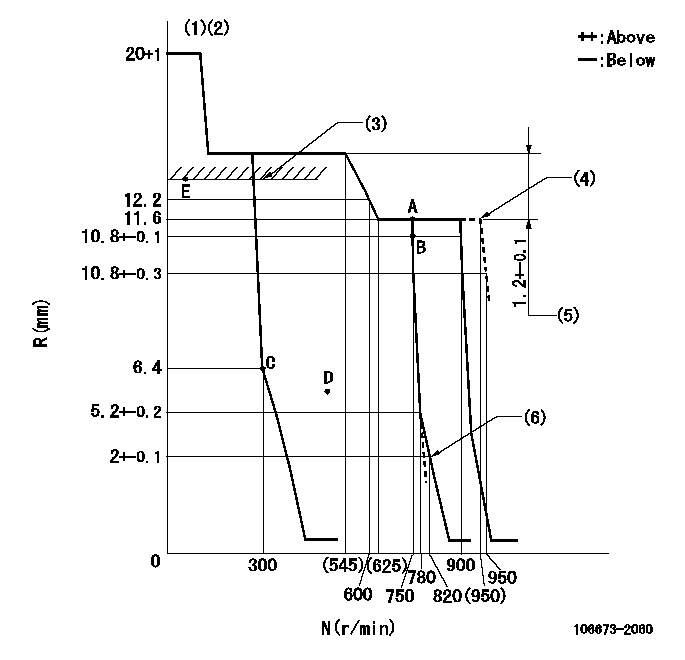
N:Pump speed
R:Rack position (mm)
(1)Target notch: K
(2)Tolerance for racks not indicated: +-0.05mm.
(3)RACK LIMIT
(4)At delivery
(5)Rack difference between N = N1 and N = N2
(6)Set idle sub-spring
----------
K=13 N1=750r/min N2=450r/min
----------
----------
K=13 N1=750r/min N2=450r/min
----------
Speed control lever angle
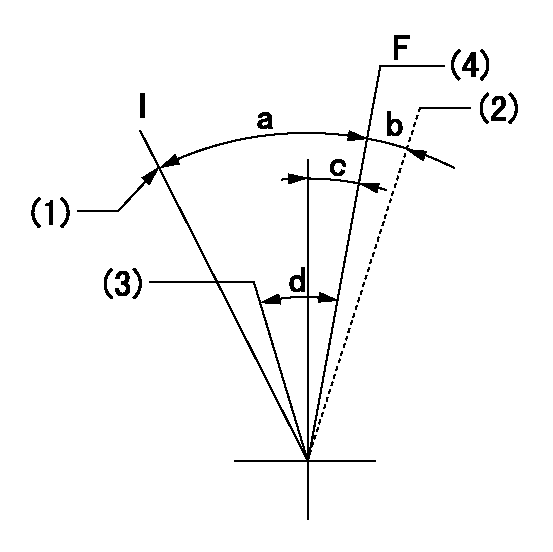
F:Full speed
I:Idle
(1)Stopper bolt setting
(2)At delivery
(3)Pump speed = aa
(4)Pump speed = bb
----------
aa=750r/min bb=900r/min
----------
a=27deg+-5deg b=(2deg) c=3deg+-5deg d=6deg+-5deg
----------
aa=750r/min bb=900r/min
----------
a=27deg+-5deg b=(2deg) c=3deg+-5deg d=6deg+-5deg
Stop lever angle
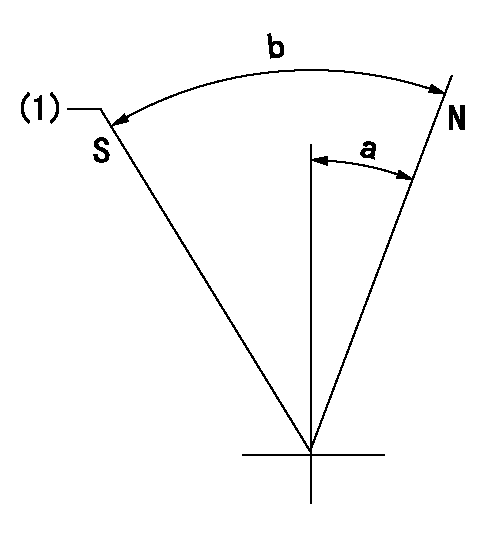
N:Pump normal
S:Stop the pump.
(1)Normal stop
----------
----------
a=39deg+-5deg b=53deg+-5deg
----------
----------
a=39deg+-5deg b=53deg+-5deg
Timing setting
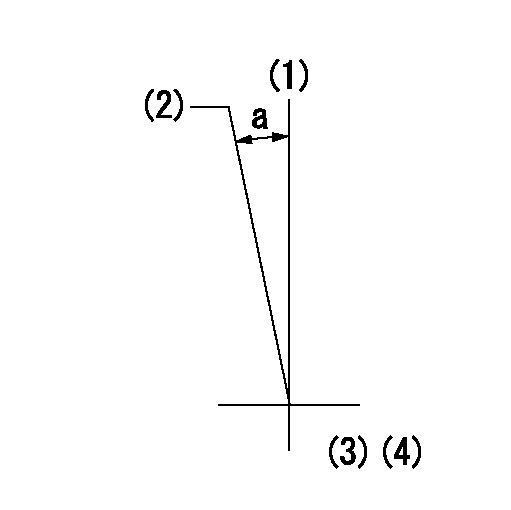
(1)Pump vertical direction
(2)Coupling's key groove position at No 1 cylinder's beginning of injection
(3)-
(4)-
----------
----------
a=(7deg)
----------
----------
a=(7deg)
Information:
Distillate Diesel Fuel
Diesel fuels that meet the specifications in the chart below will provide rated engine performance and full component service life. In North America, diesel fuel identified as No.1D and No.2D in ASTM D975 generally meet these specifications. This chart is for diesel fuels that are distilled from crude oil. Diesel fuels from other sources could exhibit detrimental properties that are not defined or controlled by this specification. There are many other diesel fuel specifications published by governments and technical societies. Those diesel fuel specifications usually do not contain all of the parameters addressed by Caterpillar in this specification. To assure optimum engine performance, a complete fuel analysis should be obtained prior to engine operation. The fuel analysis should include all of the properties listed in the Caterpillar Distillate Diesel Fuel Specifications chart. If a particular fuel does not meet the minimum Caterpillar requirements, the engine could exhibit excessive fuel system wear, fuel system failure, or excessive engine wear caused by deposits or corrosion.0.05 Percent Sulfur Diesel Fuel
In the USA, 0.05 percent sulfur diesel fuel has been used in all on-highway diesel truck engines since January 1, 1994. This low sulfur fuel was mandated as a means of directly reducing particulate emissions from diesel truck engines. This low sulfur fuel will also be used in Caterpillar commercial diesel engines where low emissions are required and where supply sources provide this type of fuel. Caterpillar has not seen any detrimental effects with 0.05 percent sulfur fuel in Caterpillar commercial diesel engines.
Heavy Fuel Oil (HFO), Residual fuel, or Blended fuel must NOT be used in Caterpillar diesel engines (except in certain 3600 Series HFO engines). Severe component wear and component failures will result if HFO type fuels are used.
Diesel fuels that meet the specifications in the chart below will provide rated engine performance and full component service life. In North America, diesel fuel identified as No.1D and No.2D in ASTM D975 generally meet these specifications. This chart is for diesel fuels that are distilled from crude oil. Diesel fuels from other sources could exhibit detrimental properties that are not defined or controlled by this specification. There are many other diesel fuel specifications published by governments and technical societies. Those diesel fuel specifications usually do not contain all of the parameters addressed by Caterpillar in this specification. To assure optimum engine performance, a complete fuel analysis should be obtained prior to engine operation. The fuel analysis should include all of the properties listed in the Caterpillar Distillate Diesel Fuel Specifications chart. If a particular fuel does not meet the minimum Caterpillar requirements, the engine could exhibit excessive fuel system wear, fuel system failure, or excessive engine wear caused by deposits or corrosion.0.05 Percent Sulfur Diesel Fuel
In the USA, 0.05 percent sulfur diesel fuel has been used in all on-highway diesel truck engines since January 1, 1994. This low sulfur fuel was mandated as a means of directly reducing particulate emissions from diesel truck engines. This low sulfur fuel will also be used in Caterpillar commercial diesel engines where low emissions are required and where supply sources provide this type of fuel. Caterpillar has not seen any detrimental effects with 0.05 percent sulfur fuel in Caterpillar commercial diesel engines.
Heavy Fuel Oil (HFO), Residual fuel, or Blended fuel must NOT be used in Caterpillar diesel engines (except in certain 3600 Series HFO engines). Severe component wear and component failures will result if HFO type fuels are used.
